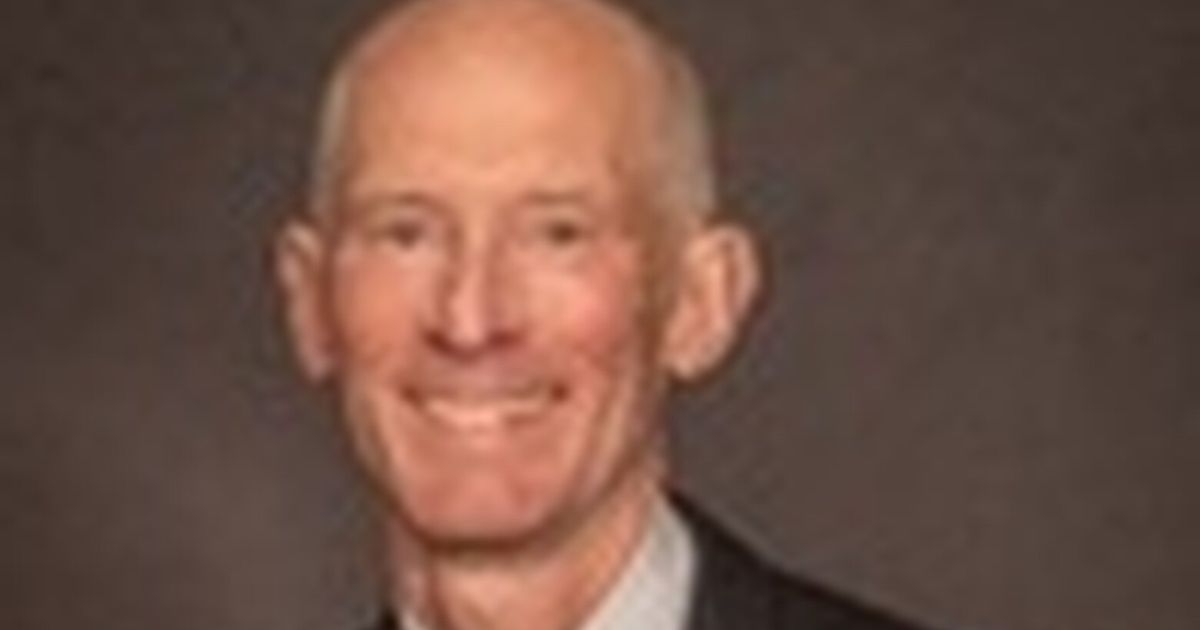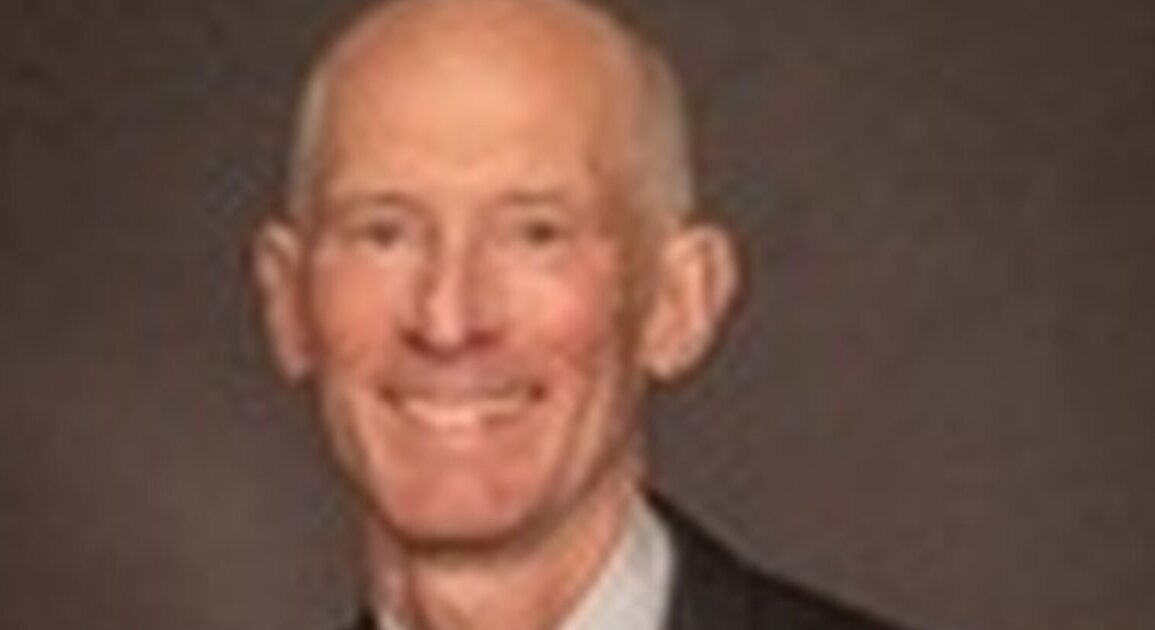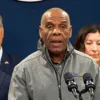
During a debate over whether the city of Newcastle would fly the pride flag in June, Mayor Robert Clark on Tuesday delivered a wide-ranging diatribe about the city’s LGBTQ+ community and reparations for Black Americans harmed by racist national policies and practices.
The mayor’s 15-minute speech, which local LGBTQ+ leaders described as shocking and offensive, highlighted tensions that have been brewing in the small, Eastside community since a council vote two weeks ago rejected flying the pride flag.
Clark argued forcefully against raising the flag, repeatedly saying that he rejected hate and division, but commenting on Newcastle’s LGBTQ+ community.
“To all of you in the pride movement, you’re very welcome in our city, but be very careful of the hate that’s in your midst. Right? It’s not coming from outside, it’s coming from within,” Clark said. He later told The Seattle Times he was referring to people in the pride movement who “speak in hateful and divisive terms.”
He went on to say that a “small, vocal minority that does not stand for Newcastle shared values is creating dissension for personal and political gain.”
At one point, Clark criticized attention to the legacy of slavery.
“How long do we hold on to grievances? A couple years, a couple of decades, a couple centuries? You want to pass down to your great-, great-grandkids that, ‘Hey, one day, you know, I was called a bad name, you know, 200 years ago, so don’t forget, man. Be a victim,’ ” Clark said.
Clark, an electrical engineer and U.S. Navy veteran, also blasted California for its reparations efforts. The state was the first in the U.S. to meaningfully introduce and pass reparations bills aimed at remedying the lingering effects of slavery.
“California was a free state with no slaves and nobody is a slave there today,” Clark claimed, incorrectly. Although California entered into the Union as a “free state,” evidence shows that slavery existed out in the open, according to the state’s historical society.
Clark continued to say about slavery, “But they can’t let go and that causes the division and hate and creates victim groups.”
Reparations are often discussed in financial terms, with a push to compensate the descendants of American slaves, but California’s bills exclude widespread payments and instead address a range of public policies.
“My jaw was on the ground,” said Ben Greschler, a member of Eastside Pride PNW who was listening to a livestream of Tuesday night’s meeting. He said he was shocked that someone in power believed that Black people should just move on from the history of slavery.
“It’s really important to understand where we’ve been historically,” added Corrinalyn Guyette, Eastside Pride’s president, who attended the meeting and also said she was shocked.
In response to an interview request, Clark told The Seattle Times by email that he did not have time to talk on Wednesday. But in the same email, he doubled down on the comments he made Tuesday, the eve of Juneteenth, the federal holiday commemorating the day in 1865 when the last enslaved people in the U.S. learned they were free.
“The perpetual victim mentality has to stop somewhere,” Clark wrote. “Of course, our history has had some imperfections. We are supposed to learn from them and grow stronger as a people. We are not supposed to linger on past slights for ever and ever. That is what is happening now. It’s not healthy and it tears the country apart.”
He added that California “was just something that came to mind because of how ridiculous it is. Juneteenth is just a coincidence.”
The saga began June 4, when Councilmember Paul Charbanneau made a motion to fly the pride flag in June. Newcastle, a city of about 14,000 residents, had raised the flag in June for at least three years.
Clark objected.
“If we start raising flags, we got to raise everybody’s,” he said during the council meeting. “We want a Hamas flag flying over the city of Newcastle? A MAGA flag? How about a Trump flag? Or an antifa flag? We’re not going there, folks. Not while I’m the mayor.”
The seven-member council shot down the proposal, with Councilmembers Tom Griffin and Steve Tallman and Deputy Mayor Pratima Lakhotia voting no alongside Clark.
Before the next council meeting, a crowd sporting colorful signs and donning rainbow attire rallied at Lake Boren Park in favor of displaying the pride flag, as reported by Fox 13.
At the park rally, Lakhotia, the deputy mayor who had previously voted against the flag-raising, announced she would be switching her vote. In a video posted to social media by the politically conservative think tank Discovery Institute, Lakhotia explains how discussions with residents led her to change her mind and conclude that a “majority of the residents support raising the pride flag.”
The crowd marched to City Hall, where council members listened to comments both for and against the flag-raising during a four-hour meeting.
Greschler and Guyette said remarks from many community members at the meeting — describing the pride flag as anti-Christian and somehow in opposition to the American flag — were painful.
Guyette, who spoke at the meeting, said she respects the American flag and is a Christian. At the same time, she noted she is a lesbian mom and that when she and her 7-year-old son see the pride flag flying, “it’s a symbol to us that we’re safe and that we’re welcomed in a community or a city.”
Guyette said she was buoyed by the positive, peaceful march but when marchers entered City Hall “it was a different story.”
Dozens lined the hallway leading to the meeting room, many holding American flags and singing Christian hymns, she said.
As she passed by, people called her a sinner and described the pride flag as a symbol of mental illness.
Many other local cities and counties — including Seattle, Bellevue and King County — openly fly pride flags in June.
“So to have the city of Newcastle choose to be one of the only cities to reverse the past history of raising the flag was a painful thing to see,” said Ginger Chien, chair of PFLAG Bellevue Eastside, referring to the initial decision two weeks ago.
Clark took issue with raising the flag simply because other cities were doing it, he said at the meeting. “How do you think my fellow council members would react if everybody suddenly had permitless carry in their cities? You think they would go along because everybody’s doing it?” he said, referring to the right to carry a concealed weapon without a state permit, which is illegal in Washington.
“The U.S. flag is the only flag we need over our cities to unite us,” he said before calling for a vote.
Charbonneau told The Times that he was “disappointed” in the mayor’s comments Tuesday. “I have to be careful myself what I say directly about my colleagues,” he said. “But I strongly encourage folks to watch the meetings and listen to those comments and make conclusions for themselves.”
After a lengthy debate, the body ultimately reversed its decision and voted 4-3 to raise the flag.
“I felt like I was finally exhaling for the first time in the last two weeks,” said Charbonneau, who tucked a small pride flag into his shirt pocket and displayed it during the council meeting.
After the meeting at around 11 p.m., a small group of city officials and residents raised the flag in the City Hall parking lot, dimly lit by streetlights. Only the four council members who supported the effort — Charbonneau, Lakhotia, Sun Burford and Ariana Sherlock — stayed for the ceremony.



